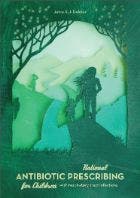Anne Dekker
Rational antibiotic prescribing for children with respiratory tract infections

- Datum
- (Co) promotoren
- 27-09-2018
- prof.dr. Th.J.M. Verheij, dr. A.W. van der Velden
Samenvatting
Around 80% of antibiotics used in health care are prescribed by general practitioners (GPs). Children mainly visit their GP with infectious diseases, and respiratory tract infections (RTI) and ear infections are responsible for most antibiotic prescriptions, despite their marginal benefit in these infections. From routine care data we provided insight in antibiotic management of childhood infections and showed targets for Dutch improvement strategies. We studied the appropriateness of antibiotic prescribing by detailed registration of RTI consultations by GPs. The overall antibiotic prescribing rate for all ages was 38%. Of these prescriptions 46% were not indicated by the guidelines. An antibiotic was prescribed in 32% of the consultations for children till 18 years, of which one third did not meet the guideline indications. In contrast to the evidence of effective interventions to reduce prescribing for adults, there is a paucity of interventions aiming to improve antibiotic prescribing specifically for children in primary care. We aimed to reduce antibiotic prescribing for children with respiratory tract infections by the RAAK intervention (Rational Antibiotic use Kids), an online training for GPs and information booklets for parents. We performed a pragmatic cluster randomized, controlled trial in primary care in 32 Dutch general practices. An antibiotic was prescribed in 21% of consultations in the intervention group, compared to 33% in the usual care group, adjusted for baseline prescribing (RR 0.65, 95% CI 0.46-0.91). The probability of reconsulting during the same RTI episode did not differ significantly between the intervention and control groups, nor did the numbers of consultations for new episodes and hospital referrals within 6 months. In the intervention group antibiotic dispensing was significantly lower than the control group (32 courses per 1000 children/year). With this trial we showed that a concise, feasible, online GP training, with an information booklet for parents resulted in a relevant reduction in antibiotic prescribing for children with RTI. From a cost-effectiveness analysis we conclude that the RAAK intervention resulted in a decrease in antibiotic prescribing for children with RTI at very low costs and should therefore be considered for implementation in primary care. We performed semi-structured interviews with parents and GPs from the trial. The information booklet confirmed parents’ pre-existing views towards antibiotics. Therefore, parents reported that it did not really change their attitude, but it did make them feel more confident to ‘wait and see’ first. In countries with a comparable context of low antibiotic use, focus of information supply should be on enhancing self-efficacy and providing safety-netting advice. GPs mentioned that most information from the training was not new to them, it did help them to brush up existing knowledge and it created more awareness of antibiotic overprescribing and for antibiotic-related problems; this motivated them to improve their prescribing routines. GPs who undertook more informal learning activities, such as reflection on their own prescribing routines, dialogue with colleagues expected that their prescription behaviour had changed more.
